American Gods Season 2 Episode 6: Donar the Great
American Gods, the TV show, is at its best when it does not limit itself to reproduce the plot of the book, and dares to dig deeper in the rich universe and mythology created by Neil Gaiman. This week’s episode did just that by exploring an incident that it is only mentioned in passing in the book and that involves the tragic death of Odin’s son, Thor. In the novel, Gaiman only mentions Thor twice, and mostly to tell us the following:
[Wednesday/Odin speaking to Shadow]: “I just keep thinking about Thor. You never knew him. Big guy, like you. Good-hearted. Not bright, but he’d give you the goddamned shirt off his back if you asked him. And he killed himself. He put a gun in his mouth and blew his head off in Philadelphia in 1932. What kind of a way is that for a god to die?“
Neil Gaiman, American Gods
In this episode, we find out what actually happened to Thor, and what compelled him to commit suicide in a hotel in Philadelphia in 1932 (they changed it to 1942 in the show). It is also an episode about how transient things are in America, and about what some people (or gods in this case) are willing to sacrifice in order to survive.
So let’s break down some of the religious references in the episode, which include Donar the Great (Thor), Columbia, Libertas, and Dvalinn. From now on, beware of spoilers…

Life is a Cabaret
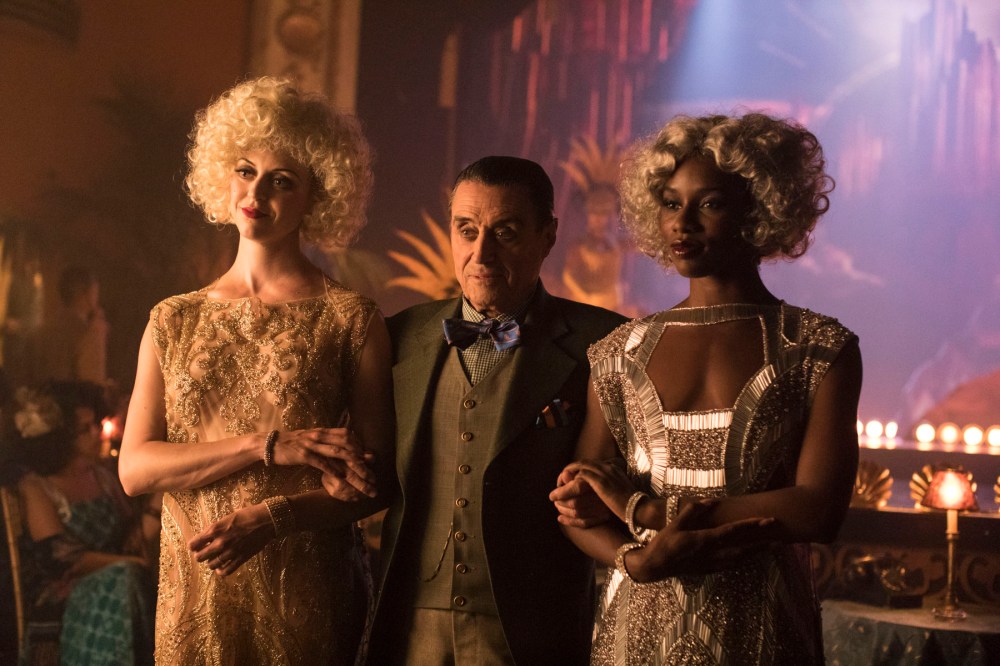
The episode begins with a flashback to the America of the Roaring Twenties, an era of economic prosperity and cultural innovation and experimentation. This the era of Jazz, of early films, and of radio. But it is also the era of prohibition and anti-immigration policies. In the world of our show, Old Gods like Wednesday (Odin) and Thor are struggling in an America that is rapidly changing and worshipping the new gods of the automobile, the telephone, the radio, and movies. In order to survive, the Old Gods need to live in the shadows, in the underbelly of society. The dire situation of the Old Gods is described in Gaiman’s novel:
“When the people came to America they brought us with them. They brought me, and Loki and Thor, Anansi and the Lion-God, Leprechauns and Kobolds and Banshees, Kubera and Frau Holle and Ashtaroth, and they brought you. We rode here in their minds, and we took root. We traveled with the settlers to the new lands across the ocean. The land is vast. Soon enough, our people abandoned us, remembered us only as creatures of the old land, as things that had not come with them to the new. Our true believers passed on, or stopped believing, and we were left, lost and scared and dispossessed, only what little smidgens of worship or belief we could find. And to get by as best we could. So that’s what we’ve done, gotten by out on the edges of things, where no one was watching us too closely. We have, let us face it and admit it, little influence. We prey on them, and we take from them, and we get by; we strip and we whore and we drink too much; we pump gas and we steal and we cheat and we exist in the cracks at the edges of society. Old gods, here in this new land without gods.“
Neil Gaiman, American Gods
And what better way to depict how low the Old Gods have fallen than to have them looking for worshippers in a burlesque club in Chicago? Here is where we find Odin, officiating as an M.C. for a cabaret-type show together with his son Thor (Donar the Great), as well as Columbia, a new goddess that represents the America of the Wild West, of horses and settlers, but that has quickly fallen out of grace in the new era of cities and skyscrapers, of cars and clubs, of jazz and industry.
Sometimes You Remind Me Of My Son…

Back in the present time, Wednesday and Shadow are looking for Dvalinn, the only dwarf with the ability to restore the runes of his spear Gungnir. They find Dvalinn working in a semi-abandoned and depressing shopping mall, which helps Wednesday make the point that malls were not long ago worshipped in America, they were a symbol for consumerism and capitalism, and here they are now, falling apart all over America, just like so many other advancements before, like the railroad, or the telegraph, or the radio… the Old Gods have survived because they know how transient and feeble human worship is. We might love our iphones now, but it is just a matter of time until we find a new love…
The most interesting part of the scene though is the comment that Wednesday makes when he tells Shadow that he reminds him of his son, Thor. Which, when we see what happened to him, it doesn’t look like a compliment…
What Are You Willing to Sacrifice?
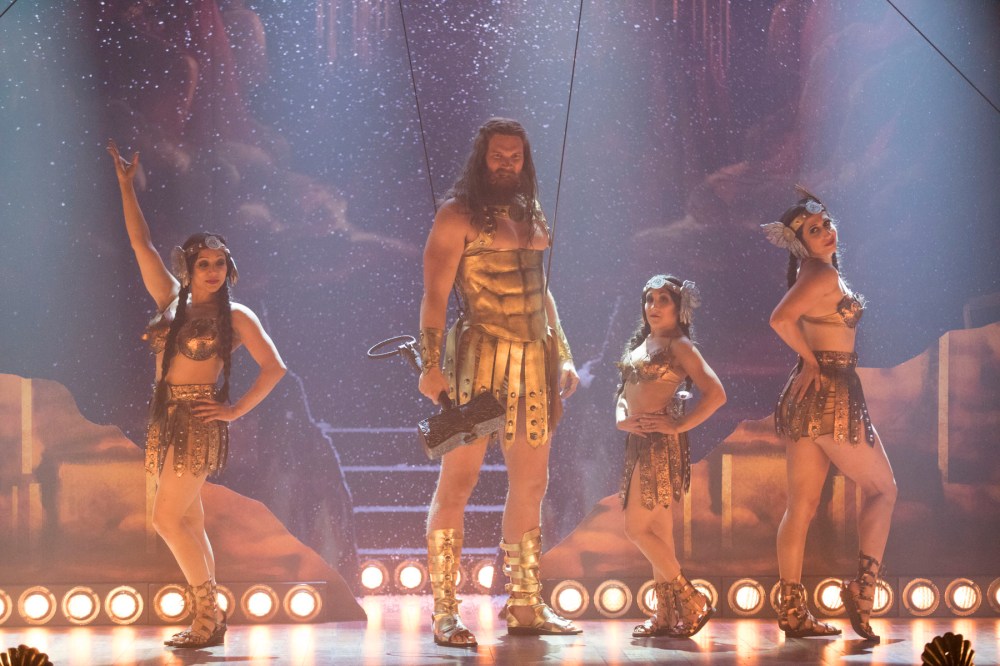
Thor is introduced in the episode as Donar the Great (Donar being his name in old high German). He is the son of Odin, and a filial son at that. He does what Odin asks of him and performs a tacky if not downright degrading sexy strongman routine as part of the burlesque show that has allowed some of the Old Gods to maintain some believers. He is in love with Columbia, a relatively new goddess that represents the ideals of America in the 19th century, that of open lands, of settlers and cowboys. As a symbol, Columbia played a very important role in America until the early 20th century, when Libertas, as in the Statue of Liberty, came to replace her as a symbol for the United States. Both, Thor and Columbia, are almost forgotten and in need to find new worshippers. If they are to survive, they will need to reinvent themselves. And that’s when opportunity knocks…
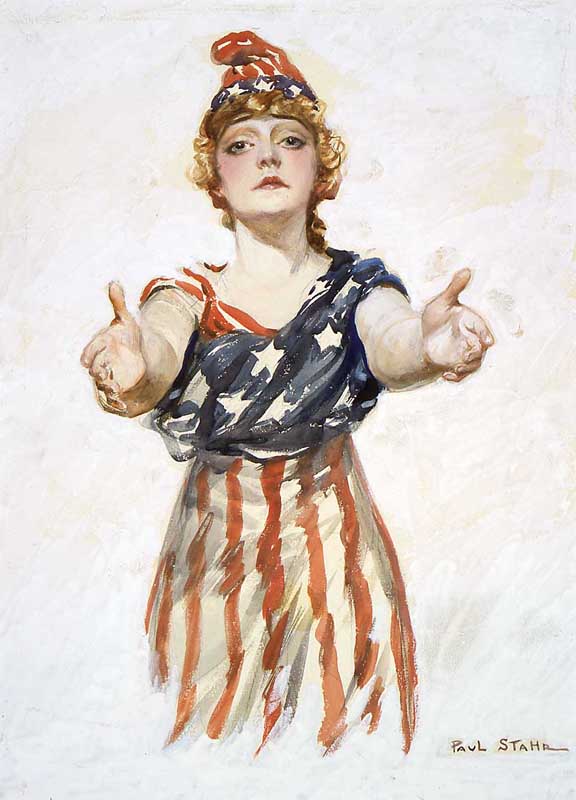
A group that calls itself Friends of New Germany, a historical organization founded by German immigrants in the 20’s that supported the new Nazi ideology that was emerging in Germany, wants Thor to help them recruit followers in America. They see themselves as “an organization rooted in American values and they see those values in Thor: strength, confidence, good breeding,” and want him to compete in a weightlifting competition in behalf of their organization. Wednesday/Odin sees this as an opportunity to be relevant again, to emerge as symbols in the new ideological landscape that is emerging in Europe. Thor is ambivalent, but when Odin suggests that this is an important opportunity, he agrees to help the Nazi organization.
What we see here is the struggle for these Old Gods/ideologies to stay relevant, but also becomes an interesting exploration of what some people (gods) are willing to sacrifice to survive and stay relevant. It also reflects on the idea that while the gods think that they are using humans for their own service and pleasure, the inverse is also true: humans can manipulate the gods as symbols for their own wars and ideological battles. And this is what the Germans did with their use of Aryan and Norse symbols and ideology, manipulating, so to speak, those gods to sever their idological purposes.
Taking a Walk On the Wild Side with Lou Reed
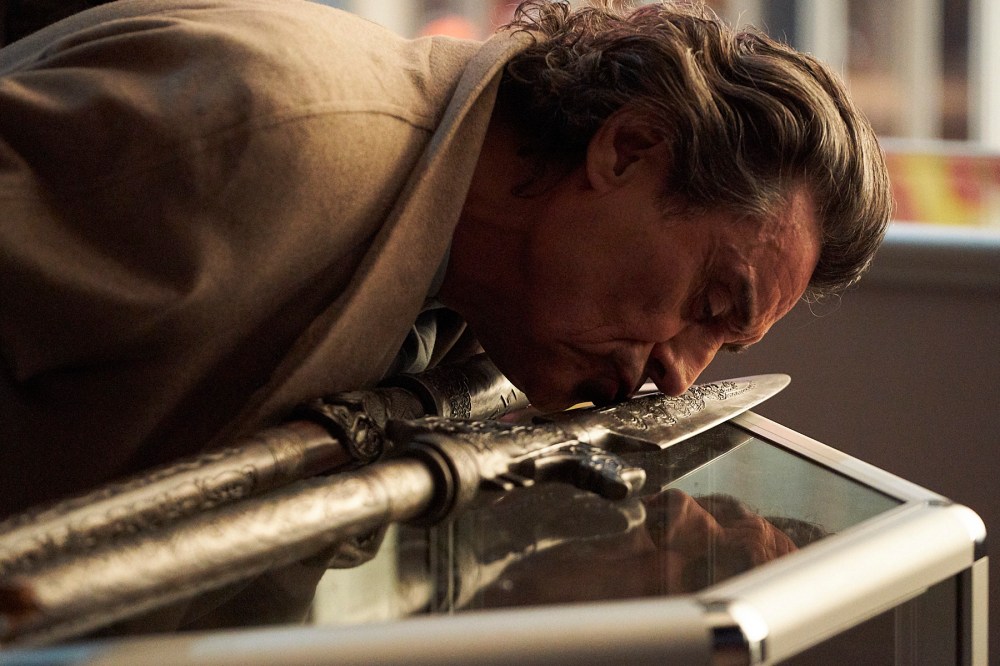
Back again to the present day, Wednesday and Shadow find Dvalinn and convince him to fix the runes of his spear Gungnir, although in order to do it, Dvalinn needs an object of power, an object that will give him enough energy to carve again the runes in the spear. Here, the writers seem to be having some fun, since the object in question is the leather jacket of Lou Reed. I won’t spend much time on this, but let’s just say that through an elaborate scam they get it, and Dvalinn restores the runes of Gungnir.
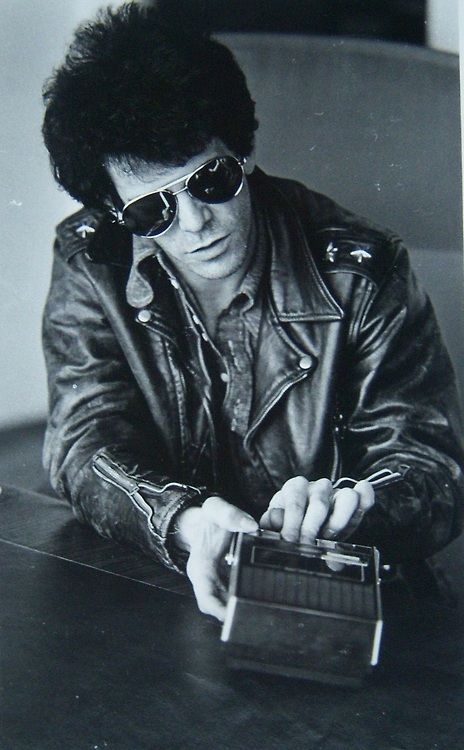
Beware Of What You Wish For
Back in the 20’s Thor seems to be having a renewed following with the Friends of New Germany. He will discover soon, though, that they were only using him. When Thor gets to the final stages of the weightlifting competition, the organization wants him to lose to a German competitor to show the weakness of America and the strength of the new Germany. Odin, his father, wants him to forfeit the fight if that means that he still gets the opportunity of being relevant, but Thor doesn’t want to do it. He has too much pride, to much honor. After a talk with Anansi (who is a manager at the Cabaret), he realizes that he is no man’s land. There is no place for him in the old world, with the Germans manipulating Norse and Aryan myths and symbols to create a horrifying new ideology, but there is also no place for him in America either: he has become irrelevant.
He decides to run away with Columbia to the West Coast to give his life a new shot, but when Odin hears about this, he, with the help of Media (New Media makes a cameo here representing the new media of the ’20s: the Telephone), lies to her by telling her that Thor has abandoned her and left with the Germans, and convinces Columbia to transform herself one more time by becoming the face of the war efforts that the rise of Nazi Germany will inevitably bring to America. She cannot compete with Lady Liberty, but she can transform her unique talents to support the inevitable war efforts that will be needed in the coming years: she becomes Rosie the Riveter.

Father Issues
The episode ends with a final confrontation between Odin and his son Thor. Thor wants to leave with Columbia to the West Coast to start a new life, but when he finds out that Odin has dissuaded her of that idea, he promises Odin that he will not do his bidding anymore. He will not continue working for the Germans, something Odin wants him to do. Here we see how Odin will associate itself with anyone in order to stay relevant and powerful, even if those worshipping are spousing genocidal ideas like the Nazis. Odin, as portrayed by Ian McShane, might be likable, but he is not a “good” God.
In a last attempt to force his son into submission, Wednesday transforms himself into Odin with his spear Gungnir and fights Thor, who is wielding his hammer Mjölnir. In the confrontation, Thor’s hammer Mjölnir breaks Gungnir (which is why the spear needs to be repaired in the present time), and Thor decides to leave Odin. In loneliness and despair, he kills himself in a hotel in Philadelphia.
Here, we also see the willingness of Odin to sacrifice his own son in order to get what he wants. The idea of sacrifice is central to religion, and it plays a very important role in American Gods. Wednesday says in the episode that sacrifice is what fuels the existence of the gods, old and new, they need to be offered and worshipped and without that, they cease to exist. The greater the sacrifice, the greater the power. In an interesting way, here we see a reverse parallel with the sacrifice of Jesus. God sacrificed Jesus, his son, (at least according to Christianity) to save all of humanity. Here, Odin sacrifices his son only to save himself.
Next Week: Treasure of the Sun
“In Cairo, Mr. Wednesday entrusts Shadow with the Gungnir spear. Mad Sweeney recalls his journey through the ages as he awaits his promised battle. Once again, he warns Shadow about Wednesday.”